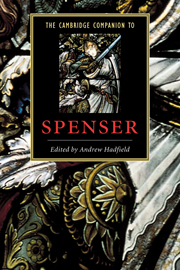Book contents
- Frontmatter
- Introduction
- 1 Spenser's life and career
- 2 Historical contexts: Britain and Europe
- 3 Ireland: policy, poetics and parody
- 4 Spenser's pastorals: The Shepheardes Calender and Colin Clouts Come Home Againe
- 5 The Faerie Queene, Books I-III
- 6 The Faerie Queene, Books IV-VII
- 7 Spenser's shorter poems
- 8 Spenser's languages: writing in the ruins of English
- 9 Sexual politics
- 10 Spenser's religion
- 11 Spenser and classical traditions
- 12 Spenser and contemporary vernacular poetry
- 13 Spenser's influence
- Index
13 - Spenser's influence
Published online by Cambridge University Press: 28 May 2006
- Frontmatter
- Introduction
- 1 Spenser's life and career
- 2 Historical contexts: Britain and Europe
- 3 Ireland: policy, poetics and parody
- 4 Spenser's pastorals: The Shepheardes Calender and Colin Clouts Come Home Againe
- 5 The Faerie Queene, Books I-III
- 6 The Faerie Queene, Books IV-VII
- 7 Spenser's shorter poems
- 8 Spenser's languages: writing in the ruins of English
- 9 Sexual politics
- 10 Spenser's religion
- 11 Spenser and classical traditions
- 12 Spenser and contemporary vernacular poetry
- 13 Spenser's influence
- Index
Summary
The title of this chapter presumably does not puzzle its readers, but its complications should be spelled out. In its earliest English uses, 'influence' (from Latin influere, to flow in) is an astrological term, referring to the way emanations from heavenly bodies affect human affairs. Human beings can be metaphorically represented as having such powers. As a term of literary study, 'influence' also draws on the image of flowing water, which is central to its Latin meaning. Spenser's best-known references to Chaucer use this image. In The Faerie Queene (IV, ii, 32) he calls him 'well [i.e. spring, source] of English vndefyled'; Spenser's pastoral alter ego, Colin Clout, conscious of his distance from his dead predecessor, imagines that he could be eloquent 'if on me some little drops would flowe / Of that the spring was in his learned hedde' (SC, 'June', 93-4). Traditional studies of a poet's influence engage both these metaphors. Nineteenthcentury philology emphasised 'source study', tracking down to their origins specific details of phrasing, plotting, or representation, as if following a stream to its head. At the same time, major poets could be viewed as having broad, as if more than earthly, powers in relation to their successors. Responding to this double understanding of influence, the articles on later poets in The Spenser Encyclopedia record specific imitations, borrowings and allusions, but also seek to identify broad and fundamental ways in which the later poet's work shows that s/he has felt the power of Spenser's.
- Type
- Chapter
- Information
- The Cambridge Companion to Spenser , pp. 252 - 271Publisher: Cambridge University PressPrint publication year: 2001

